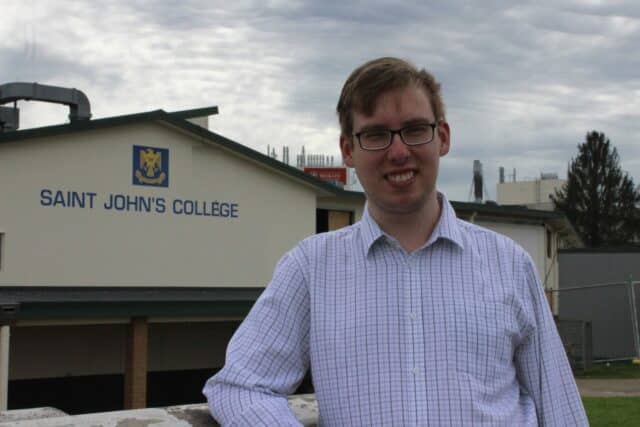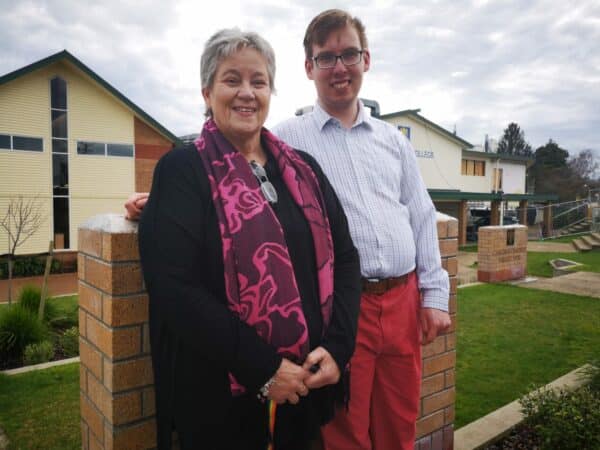Preparation: The key to tertiary success

Damien Peers outside St John’s College, Hamilton with its neighbour Waikato University in the background. Photo: Mary Anne Gill
Damien Peers is about to enter the workforce with a Diploma in Science from Waikato University and admits it would have been harder had it not been for the “accepting” lecturers he encountered.
His journey through tertiary studies was made easier by a formal diagnosis of autism when he was in Year 12 which meant he could tap into Accessibility Services at the university.
And he credits Helen Kato, his Year 13 English teacher at St John’s College in Hamilton who is also the school’s dedicated Special Needs Coordinator (SENCO), for preparing the way.
Damien, 21, was born in South Africa and moved to New Zealand with his family in 2010.
Being told he was autistic explained why he had issues in the classroom and in life.
“When I got to high school, I was finding it was taking me longer to write tests and stuff. I’m mainly a slow writer because it takes me a long time to process things sometimes. I was good at science, maths and stuff so long as I could follow the process.”
He was always interested in science and biology but struggled with National Certificate of Educational Achievement (NCEA) getting a mix of achieved and not achieved in English.
But that changed in Year 12 when smaller class sizes and extra attention from his teacher, saw him achieve his first merit in English.
“She helped a lot and the extra time gave me the ability to get things done. It was gold. I was so lucky in Years 12 and 13. Those are the years I started getting merits in English.”
Before he left secondary school, Helen Kato introduced him to Accessibility Services at the university. Its role is to support students with impairments to be successful in their studies and to ensure the university is inclusive and accessible.

Waikato University graduate Damien Peers with his St John’s College, Hamilton English teacher Helen Kato, who is now the full time Special Education Needs Coordinator (Senco) at the school. Photo: Mary Anne Gill.
“I had a meeting with them and was able to chat with them about how I learn best.
“Settling in wasn’t too bad. Early on they got me 10 minutes for every hour extra, that still wasn’t enough. I wasn’t finishing all my assignments, so they were able to get me 25 minutes for every hour extra and then I was able to get a lot more done.
“The lecturers were very accepting and happy to help any person who needed help. I found them very supportive.”
Covid lockdowns and studying online complicated things for Damien.
“Certain aspects were easy online, some of the tests I was getting more done probably because I could have more notes etc.
“It was a bit sad though because we missed all the practical stuff that I really enjoy like working in the lab and doing fieldwork,” he says.
“Socially I’m quite confident. I’ve been told sometimes I might repeat myself. Otherwise socially I can hold a conversation. It’s just mainly the processing, slow writing skills that I struggle with.”
He completed his diploma in July 2022 and is now going to interviews to do what he likes best.
“I enjoy the practical fieldwork than trying to write reports. With reports I struggle to get the structure right.”
Damien’s advice to other autistic students is to follow your heart, know what you are good at and know what you enjoy.
“Otherwise, it’s going to be a real battle. I hear some (autistic) people barely get out of high school.
“But I was lucky, I was well prepared.”
There were some difficulties, but he overcame them.
“There have been times I have been quite down and sad through my experiences. But most of the time I’ve been able to find a solution that works for me.”
Talking to family members and accessing university services helped.
That desire to get into the workforce and his struggles with writing assignments was why he went for a science diploma rather than a degree.
“That’s probably me done at university. You never know in 10 years but at this point I’m ready to start working.”
Check out Supporting Autistic Tertiary Learners guides that offer information and strategies under six themes:

